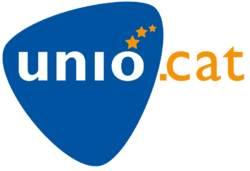Democratic Union of Catalonia
| Democratic Union of Catalonia Unió Democràtica de Catalunya | |
|---|---|
 | |
| President | Josep Antoni Duran i Lleida |
| Secretary | Josep Maria Pelegrí i Aixut |
| Founded | November 7, 1931 |
| Headquarters |
C/Nàpols, 35-39 Barcelona |
| Ideology |
Catalan nationalism Regionalism Christian democracy[1] Pro-Europeanism |
| Political position | Centre-right |
| European affiliation | European People's Party |
| International affiliation | Centrist Democrat International |
| European Parliament group | European People's Party |
| Colours | Blue, White |
| Parliament of Catalonia |
0 / 135 |
| Congreso de los Diputados |
0 / 350 |
| Spanish Senate |
1 / 266 |
| European Parliament |
1 / 54 |
| Website | |
| http://www.unio.cat/ | |
|
Politics of Catalonia Political parties Elections | |
The Democratic Union of Catalonia (Catalan: Unió Democràtica de Catalunya, UDC; IPA: [uniˈo ðəmuˈkɾatikə ðə kətəˈɫuɲə]) is a regionalist and Christian democratic political party in the Catalonia region of Spain. Together with the Democratic Convergence of Catalonia, until 2015 it was part of the Convergence and Union (CiU) coalition. They ruled the Generalitat de Catalunya until its breakup. Now only Democratic Convergence rules the government.
It describes itself as Catalan nationalist and Christian democrat, and is a member of the European People's Party (EPP), and a full member of The Union of the Robert Schuman Institute for Developing Democracy in Central and Eastern Europe located in Budapest, Hungary.
Break with the CiU
By June 2015 tensions within the two parties forming the Convergence and Union federation had reached an all-time high in June 2015 due to differences between the positions of the UDC leadership and the Democratic Convergence (CDC) leader Artur Mas over the sovereignty process. CDC was in favour of outright independence even if it meant breaking the established Spanish legality, while UDC was against doing it without the acceptance of the Spanish government.
As a result, a referendum of UDC members was held on 14 June 2015, asking whether UDC should commit itself to continue with the process but with certain conditions, including not violating the legality in force through unilateral independence declarations or starting constituent processes at the margin of legal norms.[3][4] Such a position, supported by UDC leaders and contrary to the signed agreements between CDC, ERC and sovereignty entities, was approved by UDC members with an adjusted 50.9%.[5] After this, meetings between UDC and CDC leaders led to an ultimatum from CDC to UDC for the latter to decide within "two or three days" whether it committed itself to the independence plan.[6]
On 17 June, after a meeting of the UDC leadership, it was announced that UDC was withdrawing all three of its members from the Government of the Generalitat of Catalonia, although they agreed to maintain parliamentary stability until the end of the legislature.[7] That same day at night, the CDC National Executive Committee met and in a press conference the next day confirmed that UDC and CDC would not stand together in the 2015 regional election, and that the political project of the CiU federation was over, spelling the end of 37 years of cooperation between both parties as Convergence and Union.[8][9]
Later in July 2015, a pro-independence faction of the UDC broke away to found the Democrats of Catalonia.
In the 2015 Catalonian parliamentary election the UDC lost all its 13 seats in the Catalonia Parliament.
References
- ↑ "Parties and Elections in Europe, "Spain", The database about parliamentary elections and political parties in Europe, by Wolfram Nordsieck". Parties & Elections. 19 March 2013. Retrieved 19 March 2013.
- ↑ Spanish seats.
- ↑ "Unió will consult its members in order to define itself on the sovereignty process" (in Spanish). El País. 2015-02-21.
- ↑ "Union will put to vote its commitment to the sovereignty plan" (in Spanish). El País. 2015-06-14.
- ↑ "Duran obtains an adjusted support to condition Mas' plan" (in Spanish). El País. 2015-06-14.
- ↑ "Mas gives Duran three days to decide if he supports the independence" (in Spanish). El País. 2015-06-15.
- ↑ "Union leaves Mas' government as rejection to his independence plan" (in Spanish). El País. 2015-06-17.
- ↑ "CiU disintegrates: "The political project of the federation is over"" (in Spanish). El Mundo. 2015-06-18.
- ↑ "Convergence announces the end of CiU: "The common project is over"" (in Spanish). El País. 2015-06-18.
External links
| ||||||||||||||||||||||||
| ||||||||||||||||||
| ||||||||||||||||||||||||||||||||||||||||